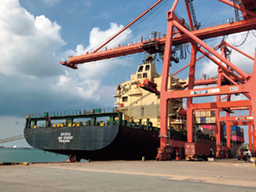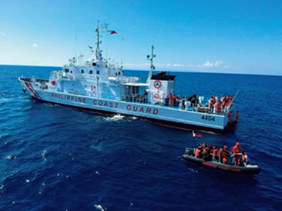ODA Topics 2
Promoting Initiatives Towards the Realization of a “Free and Open Indo-Pacific”
A “Free and Open Indo-Pacific (FOIP)” is a vision aimed at promoting peace, stability, and prosperity across the Indo-Pacific region by making the Indo-Pacific free and open as “international public goods,” through ensuring a rule-based international order, promotion of the rule of law, freedom of navigation, peaceful settlement of disputes and free trade, and self-reliant and sustainable growth.
The Indo-Pacific region, which extends from the Asia-Pacific through the Indian Ocean, to the Middle East and Africa, is the core of global dynamism, inhabited by half of the world’s population. In order to bring peace and prosperity to this region, there is a need to (i) enhance connectivity within the region such as through quality infrastructure development based on international standards, (ii) pursue economic prosperity by encouraging autonomous and sustainable growth, and at the same time, (iii) secure peace and stability by eliminating factors that inhibit prosperity, such as piracy and terrorism. Japan has been advancing specific efforts to realize a “Free and Open Indo-Pacific” in cooperation with various countries, while utilizing ODA in a strategic and effective manner.

Sihanoukville Port in Cambodia, constructed with Japan’s assistance (Photo: JICA)

Multipurpose vessel provided to the Philippine Coast Guard (Photo: JICA)
The “Free and Open Indo-Pacific” was first announced by Prime Minister Abe in August 2016, and the vision is supported by many countries and regions. For example, the ASEAN Outlook on the Indo-Pacific (AOIP) was adopted at the ASEAN Summit held in June 2019, and the AOIP clearly sets out connectivity and maritime cooperation as areas for cooperation, among others. Japan fully supports the AOIP, which represents the vision of ASEAN, and aims to pursue synergy (multiplier effect) with the “Free and Open Indo-Pacific.” Furthermore, the outcome document for TICAD7 held in Yokohama in August 2019 stated that the heads of state of Africa and others “take good note of the initiative of a free and open Indo-Pacific.” Japan will further strengthen multi-layered cooperative relations while working closely with various partners, including the United States, Australia, India, Europe, and Southeast Asia, which is an extremely important region in the realization of a “Free and Open Indo-Pacific.”
At the G20 Osaka Summit under the Presidency of Japan in 2019, the heads of the G20, including emerging donor countries such as China and India, endorsed the G20 Principles for Quality Infrastructure Investment. These Principles cover important elements such as openness, transparency, economic efficiency, and debt sustainability, and serve as an international standard for the development of quality infrastructure as an important foundation for the realization of a “Free and Open Indo-Pacific.” The implementation of the Principles contributes to the huge demand for infrastructure in developing countries both quantitatively and qualitatively. In view of that, Japan aims to promote the Principles in cooperation with the respective countries and in turn, stimulate sustainable growth (see “Connecting the World with Quality Infrastructure” and “Quality Infrastructure” for details).
For example, Japan has recently decided to support the construction of a multipurpose commercial port in Matarbari of south-eastern Bangladesh. This project aims to accelerate logistics with neighboring countries, and supports Bangladesh in its efforts to become a middle-income country by contributing to the economic growth of the country. Moreover, in Madagascar, Japan is undertaking a project to widen an existing arterial road to two lanes through the construction of two bridges. This will improve transport capacity and vitalize logistics in the country. Furthermore, in Djibouti, Japan is engaged in the construction of a ferryboat that can operate even during the monsoon season and the development of port facilities, in order to enhance maritime transport capacity between the capital and the city of Tadjourah in the north. This project is expected to contribute to the development of socio-economic foundations for sustainable development in the country. In addition, Japan is also advancing initiatives toward strengthening connectivity of the East-West Economic Corridor and Southern Economic Corridor in the ASEAN region, which fulfills an important role as a hub of the Indo-Pacific region. To that end, efforts are steadily underway, including the development of Sihanoukville Port in Cambodia, renovation of bridges on National Road No. 9 in Laos, and the development of the Thilawa Special Economic Zone in Myanmar, among other projects.
In order to realize a “Free and Open Indo-Pacific,” it is also necessary to put in place countermeasures against factors that impede economic development, such as piracy, terrorism, proliferation of weapons of mass destruction, natural disasters, and illegal fishing. Other important initiatives include human resource development and the establishment of rules through supporting the development of legal systems and legal capacity building, and the capacity building of maritime law enforcement and Maritime Domain Awareness through the provision of patrol vessels and coastal monitoring radar equipment, and training for the staff of maritime security agencies of each country and dispatch of Japanese experts, which also promotes the safety of maritime transport. One such example is the utilization of various ODA schemes to provide comprehensive support to the Philippine Coast Guard, which contributed to enhancing its maritime law enforcement capacity by providing equipment including high-speed boats and technical cooperation, such as training that utilized the equipment provided, as well as maritime training (see “The Seas” for details).
The stability and prosperity of Japan and this region cannot be achieved without a “Free and Open Indo-Pacific” that is underpinned by transparent rules and the active exchanges of people, goods, and wisdom. For this reason, Japan will continue to utilize various forms of cooperation to accelerate its initiatives alongside all countries and regions that share fundamental principles in order to realize a “Free and Open Indo-Pacific.”
